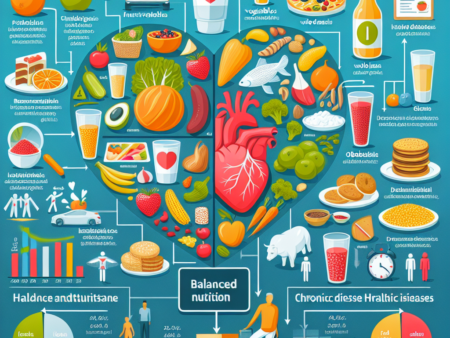Panduan praktis untuk mencapai nutrisi seimbang dalam diet vegetarian. Tips dan trik untuk memastikan asupan nutrisi yang cukup.
Nutrisi Seimbang untuk Vegetarisme: Tips dan Trik
-
Table of Contents
- Introduction
- The Basics of Vegetarianism
- 1. Lacto-ovo vegetarian
- 2. Lacto-vegetarian
- 3. Ovo-vegetarian
- 4. Vegan
- Key Nutrients for Vegetarians
- 1. Protein
- 2. Iron
- 3. Calcium
- 4. Vitamin B12
- 5. Omega-3 Fatty Acids
- Tips and Tricks for Balanced Nutrition
- 1. Plan Meals in Advance
- 2. Include a Variety of Protein Sources
- 3. Incorporate Iron-Rich Foods with Vitamin C
- 4. Consume Calcium-Rich Foods
- 5. Consider Vitamin B12 Supplementation
- 6. Include Omega-3 Fatty Acids
- Conclusion
Introduction

Vegetarianism is a dietary choice that has gained popularity in recent years. Many people choose to follow a vegetarian diet for various reasons, including ethical concerns, environmental sustainability, and health benefits. However, it is important for vegetarians to ensure they are getting all the necessary nutrients to maintain a balanced diet. In this article, we will explore the concept of balanced nutrition for vegetarians and provide tips and tricks to help vegetarians meet their nutritional needs.
The Basics of Vegetarianism
Vegetarianism is a dietary practice that excludes the consumption of meat, poultry, and seafood. However, there are different types of vegetarian diets, each with its own set of guidelines:
1. Lacto-ovo vegetarian
A lacto-ovo vegetarian diet includes plant-based foods, dairy products, and eggs. This is the most common type of vegetarian diet.
2. Lacto-vegetarian
A lacto-vegetarian diet excludes eggs but includes dairy products.
3. Ovo-vegetarian
An ovo-vegetarian diet excludes dairy products but includes eggs.
4. Vegan
A vegan diet excludes all animal products, including dairy, eggs, and honey.
Regardless of the type of vegetarian diet followed, it is essential to ensure that the diet is nutritionally balanced to meet the body’s needs.
Key Nutrients for Vegetarians
When following a vegetarian diet, there are several key nutrients that may require special attention:
1. Protein
Protein is an essential nutrient for the body, as it is responsible for building and repairing tissues. While meat is a common source of protein, vegetarians can obtain protein from plant-based sources such as legumes, tofu, tempeh, seitan, and quinoa. It is important to include a variety of protein sources in the diet to ensure all essential amino acids are obtained.
2. Iron
Iron is necessary for the production of red blood cells and the transportation of oxygen throughout the body. Plant-based sources of iron include dark leafy greens, lentils, beans, fortified cereals, and dried fruits. To enhance iron absorption, it is recommended to consume iron-rich foods with a source of vitamin C, such as citrus fruits or bell peppers.
3. Calcium
Calcium is essential for maintaining strong bones and teeth. While dairy products are a common source of calcium, vegetarians can obtain calcium from plant-based sources such as fortified plant milks, tofu, tempeh, almonds, and leafy greens like kale and broccoli.
4. Vitamin B12
Vitamin B12 is primarily found in animal products, making it a nutrient of concern for vegetarians. It is important for red blood cell production and neurological function. Vegetarians can obtain vitamin B12 from fortified plant-based foods like breakfast cereals, plant milks, and nutritional yeast. However, it is recommended to consult a healthcare professional and consider supplementation to ensure adequate intake.
5. Omega-3 Fatty Acids
Omega-3 fatty acids are essential fats that play a crucial role in brain health and reducing inflammation in the body. While fish is a common source of omega-3 fatty acids, vegetarians can obtain them from plant-based sources like flaxseeds, chia seeds, walnuts, and algae-based supplements.
Tips and Tricks for Balanced Nutrition
Now that we have identified the key nutrients for vegetarians, let’s explore some tips and tricks to ensure a balanced vegetarian diet:
1. Plan Meals in Advance
Planning meals in advance can help ensure that all necessary nutrients are included in the diet. Aim to include a variety of plant-based protein sources, whole grains, fruits, vegetables, and healthy fats in each meal.
2. Include a Variety of Protein Sources
As mentioned earlier, it is important to include a variety of protein sources in the diet to obtain all essential amino acids. Experiment with different plant-based proteins like legumes, tofu, tempeh, and quinoa to add variety to your meals.
3. Incorporate Iron-Rich Foods with Vitamin C
To enhance iron absorption, pair iron-rich foods with a source of vitamin C. For example, add bell peppers or citrus fruits to a lentil salad or squeeze lemon juice over cooked spinach.
4. Consume Calcium-Rich Foods
Include calcium-rich foods in your diet, such as fortified plant milks, tofu, tempeh, almonds, and leafy greens. Aim for three servings of calcium-rich foods per day to meet your calcium needs.
5. Consider Vitamin B12 Supplementation
Since vitamin B12 is primarily found in animal products, vegetarians should consider supplementation or consult a healthcare professional to ensure adequate intake. Regular blood tests can also help monitor vitamin B12 levels.
6. Include Omega-3 Fatty Acids
Include plant-based sources of omega-3 fatty acids in your diet, such as flaxseeds, chia seeds, walnuts, and algae-based supplements. Aim for at least two servings of omega-3-rich foods per week.
Conclusion
Following a vegetarian diet can be a healthy and sustainable choice. By paying attention to key nutrients like protein, iron, calcium, vitamin B12, and omega-3 fatty acids, vegetarians can ensure a nutritionally balanced diet. Planning meals in advance, including a variety of protein sources, and incorporating iron-rich foods with vitamin C are some of the tips and tricks that can help vegetarians meet their nutritional needs. Remember to consult a healthcare professional for personalized advice and consider supplementation when necessary. With proper planning and knowledge, vegetarians can thrive on a balanced and nutritious diet.







